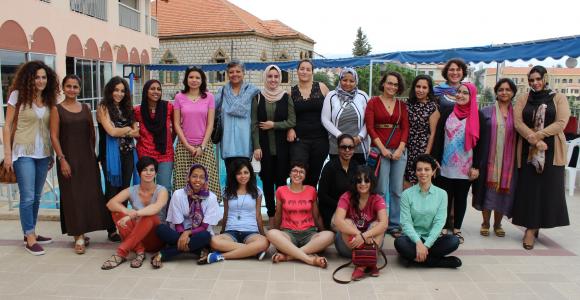Public Sphere
NGOs Case
Gender Perspective
WHRD
Supreme Council of Armed Forces
Repression
Monitor the Parliamentarian Election 2010
Violence Against Women
Draft Law
Exploring Taboos
Women Politicians
Egyptian Parliament
Sexual Harassment
Iran
Islamic Feminism
Gender Mainstreaming
Bahrain
Transitional Justice
International Agreements
Films
Independent Women NGOs Coalition
UN
Women Trafficking
Women Rights
Solidarity
Training
Storytelling
Oman
Nigeria
Nazra Newsletter
Tips and Guidelines
Virginity Test
Peaceful Assemblies
Feminism
Sexuality
Women and Parliament
Elections
Constitution
Masculinity
The National Council for Women
Human Rights Council
Sudan
Early Marriage
The Feminist Leadership, Movement Building and Rights Institute Middle East and North Africa
News
3 Nov 2015
Crea Organisation held in partnership with Nazra for Feminist Studies the “Feminist Leadership, Movement Building and Rights Institute in Middle East and North Africa”, where the institute took place in Broummana, Lebanon from the 23rd till the 27th of August 2015.
The institute was mainly a course that had been designed to strengthen feminist leadership, strategies and collective power for social transformation in Middle East and North Africa. The institute also included discussions and reflections on the current political landscape, and the history of organizing strategies that had been used by the various women’s rights movements and groups in the region. One of the institute’s main aims was looking at the diverse movements in MENA and globally, where the participants had the opportunity to explore and analyze the experiences and lessons from those movements while reflecting on their own movements, local and regional contexts.
The participants of the institute were able to analyze the realities of feminist movements in the MENA region, where strategies for strengthening the links between movements who aim at advancing women’s rights and building a feminist movement were identified and explored.
The institute addressed the following topics:
Feminist movements and power, Patriarchy, Social movements and their characteristics, the Differences between organizations and social movements, Feminist Leadership, Deep structures within organizations, the Feminist and the Women’s Movements in the MENA region, Women in conflict (the Case of The case of Salmmah Women’s Resource Centre in Sudan), the Feminist Movement, Organizations and Leadership, Issues of Gender and Communications, the Role of Law in Arab Societies, Women and Peace Building (The Case of Libya), Creative Writing from a Feminist Perspective, Sexuality and Feminism.
The institute’s faculty consisted of: Ms. Srilatha Batliwala, Dr. Hala Kamal, Dr. Hania Al-Sholkamy, Dr. Zeina Zaatary, Ms. Mozn Hassan, Ms. Zahra' Langhi, Ms. Fahima Hashim, and Ms. Nadine Moawad.
The institute was keen on providing a space for the participants to express their personal and institutional reflections, which would contribute to the strengthening of the participants’ leadership skills and strategies that aim at effecting real change for women’s rights, feminist movements, and social justice in the Middle East and North Africa.
Permalinkhttp://nazra.org/en/node/432


